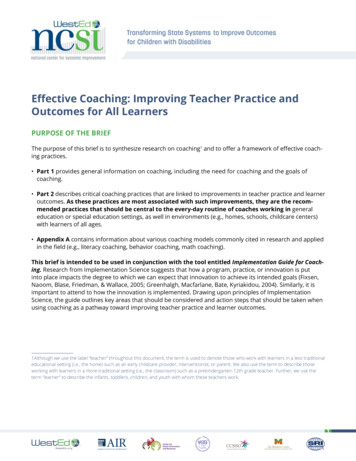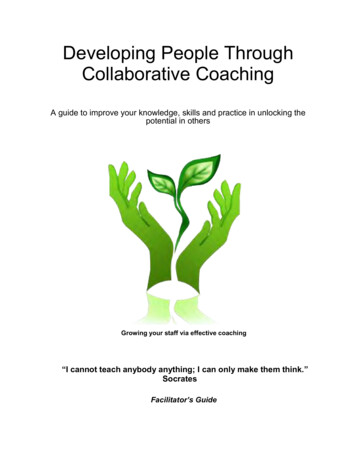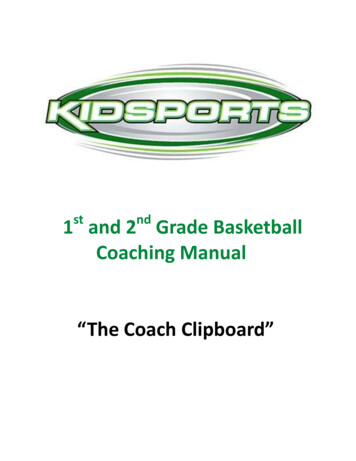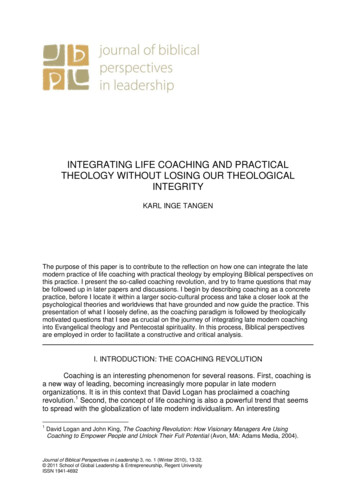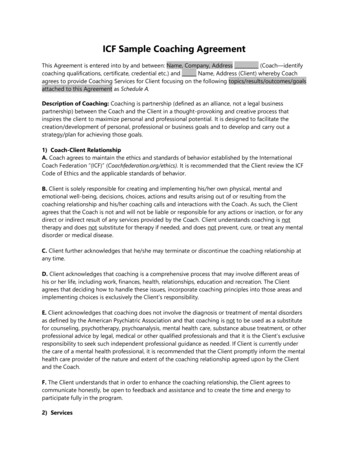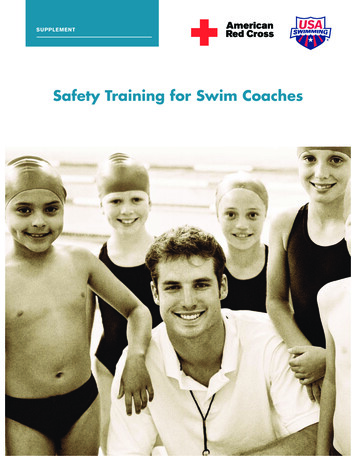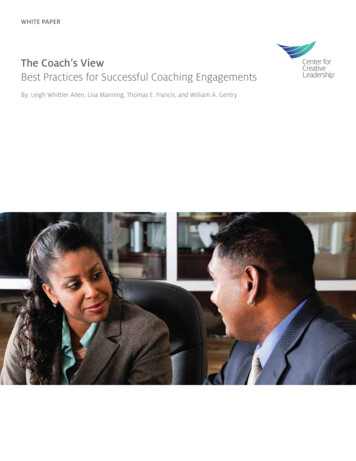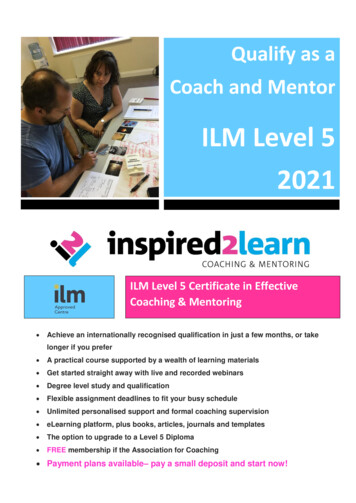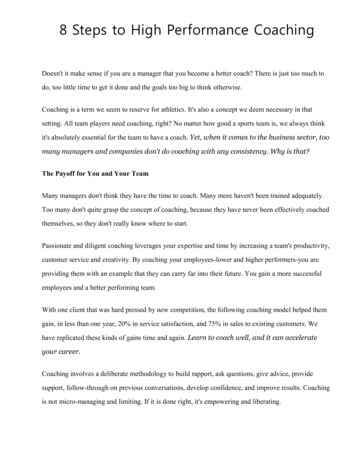
Transcription
First Coaching Conversation – CoachFocus on: Relationship BuildingThe initial meeting is one of the most important conversations you will have with yourcoachee. This is the time to start building rapport and trust. Take time to get to knoweach other a little bit.Who are you? Who am I? Tell them a little bit about yourself and your own leadership journey. Ask them why they applied to the program. Ask them what they hope to get out of the program year.Prompting Questions: Tell me a little bit more about the activities you are involved in. What motivated you toget involved? To stay involved? Say more about the role(s) you play in those groups/organizations/activities. What hasgiven you the greatest sense of accomplishment? What does this tell you about yourself? You will soon finish school with an MIT degree and hopefully the sense that you havedeveloped leadership skills. If the next two years included real growth and opportunitiesfor leadership development, what would they look like?Notes:
Why are we here? It is important for you to emphasize that they should be thinking about a leadershiplearning goal to work on for the year, which will really be the foundation for the coachingrelationship. Take some time to talk about how you each define leadership.Notes:Ground rules and expectations: Together set some expectations for how the two of you want coaching sessions to work. How often to meet? Where? What is a realistic amount of time to spend at each meeting?(At least one hour is recommended)Ground Rules:Next Steps: What should we be thinking about for our next meeting?Notes:* Potentially exchange cell phone numbers.
Second Coaching Conversation – CoachFocus on: Goal Setting and Creating an Action PlanCheck-in:Take the opportunity to check-in with your coachee and continue to build the relationship. Howwas their day/week? What has been happening (academically, socially, etc.) since the last timeyou saw them? How was the rest of the CCLP Kick-off for them?Identify the Goal(s):Work with your coachee to identify specific Leadership Learning Goals for the year (keep in mindthat these can and will morph as the year progresses). The LPI Tool will provide a foundationupon which they can focus. Based on the LPI tool, what did you learn about your strengths? Your opportunities forgrowth?Which of the practices are you most comfortable with? Why? What can you do to usemore frequently a practice for which you scored lower?What leadership skills do you specifically want to develop during your undergraduateexperience? What do you want to be better able to do? What experiences might help youget there?Refine the Goal and Create a Plan:Are the goal(s) stated meaningful? Actionable? Achievable? Specific enough? What is it about this goal that is inspiring and exciting to you? Is it meaningful andimportant to you? Is this goal really useful to you right now?
You want to accomplish X so that what? What do you hope to get out of accomplishingthis goal?How will you know when you’ve achieved your goal? What does “success” look like? Bywhen do you want to see progress/results?What are the tactics and things you are going to actually do in order to achieve the goal?What steps do you need to take?What are some obstacles you need to overcome?Work with your coachee to brainstorm a list and put them in order of action with a date bywhen they will be accomplished.
Feedback and ReflectionThey need to ask for feedback! In order for your coachee to fully apply their learning and growfrom this experience they must not only ask for feedback from others but also take the time forpersonal reflection. Who do you trust to give you honest feedback about how effective you were atsomething?Do you feel comfortable asking your peers for feedback?Who else can you get feedback from about your goals and development plan?When you finish a project or major program/activity, how do you process what youlearned? Do you stop and think about what you did well and what you might dodifferently next time?How and when do you find time to process experiences you have had and learn lessonsfrom them?Next Steps: What should happen by our next meeting? What are your next specific actions?
Ongoing Coaching Conversation – CoachTake the opportunity to check-in with your coachee before jumping into the focus of the day’sconversation. How’s their day/week been going? What’s new in their lives?You can also check-in more specifically on: Action items from your last conversation. Any feedback they have received (or sought out) from peers, staff, faculty, etc. – and howdid that go? What are their thoughts on the feedback?Focus and/or goal(s) for today:Next Steps: What should happen by our next meeting? What are your next specific actions?
Preparing for the summer – CoachThis coaching session should focus on detailing out a CCLP plan for the summer.Take this opportunity to discuss with your coachee how they plan to stay in contact with you(email, skype, in person, phone, etc.), how often (once a month, three sporadic times, every otherweek, etc.), and what they hope to accomplish over the summer.How will we stay in contact? How often? How will we share notes?More specifically: What are their action items for the summer? What do they want to accomplish before coming back to MIT in the fall? What other individuals (potential supervisors, mentors, peers, etc) can help your coacheeover the summer with their goals?
Next Steps: What should happen by our next meeting? What are your next specific actions?
First Coaching Conversation – Coach Focus on: Relationship Building The initial meeting is one of the most important conversations you will have with your coachee. This is the time to start building rapport and


